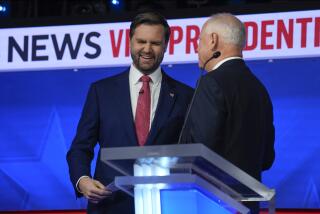Debaters Talk It Out, Fast and Furious
- Share via
FULLERTON — It was a war of words, a David versus Goliath struggle fought in a dusty classroom at Cal State Fullerton.
But this time Goliath won.
Thirty-four debate teams from universities across the nation participated in the 13th annual Winter in the Sun intercollegiate tournament here. The tournament, which began Tuesday, concludes today with an awards ceremony.
Participating universities included Harvard, the University of La Verne, Wake Forest, Illinois State, the U.S. Naval Academy, the University of Utah, the University of Texas and USC.
During a preliminary round Tuesday, two students from Harvard squared off against two from underdog University of La Verne. The students sat at a desk behind a clutter of files and notes. Behind them were boxes filled with even more research.
This was a grudge match of sorts for Harvard. La Verne had defeated Harvard last year in national debate competition, and Ivy Leaguer Sam Cooper, 21, a senior majoring in government, was out for revenge. “I never heard of La Verne before last year,” he said. “We need this win.”
During the round, Cooper, wearing gold-rimmed glasses, a light button-down shirt and a navy blue-and-tan striped tie, gathered his notes and stood up slowly. He took a deep breath and waited for the judge to give the signal.
The collegians debated on the topic chosen nationally for all contests during the 1989-90 school year: “It is resolved that the federal government should adopt an energy policy which substantially reduces non-military consumption of fossil fuels in the United States.”
Cooper had nine minutes to present an affirmative argument, which meant defining terms and explaining his team’s position on the use of alternative fuel sources.
Standing with a stoic face, Cooper hit his stopwatch and rattled off his arguments. He stopped only to take quick deep breaths and continued to fire off the key points.
Becky Bjork, a forensics coach from the University of Utah and a judge in the competition, told a visitor: “If this is the first time you hear debaters, you’ll be amazed at how fast they talk. But the more you hear it, the easier it is to pick out the key points.”
From La Verne, Tony Lacsamana, 26, a senior majoring in political science, had the task of refuting the Harvard team’s proposals. He questioned Cooper and demanded to see references.
Cooper’s teammate, Matt Schnall, 21, crawled beneath the desk to search the files for more evidence supporting his team’s arguments.
Bjork sat there jotting down as fast as she could on a yellow legal pad the key elements of Cooper’s arguments. She used a black pen to indicate Harvard’s side and when the La Verne team began to cross-examine, she used a red pen. Her writing was in a small, fine print.
Bjork said she would choose the winner of the debate by putting down the affirmative side’s arguments and proposals and seeing if the negative team disputes them.
“After listening to debaters on the topic for months, I have no problem picking out their arguments no matter how fast they talk,” Bjork said.
She announced at the end of the round that Harvard had won.
La Verne debater Lacsamana said afterward: “We’re generally the underdog. This was a real slow round for us. Harvard has an excellent program and a good library with a lot more resources.”
Schnall, a philosophy and math major at Harvard, said: “We began researching in the summer. It’s a pretty significant burden but nothing unmanageable. It definitely takes away time from the social scene at college.”
The final round of the competition was held late Wednesday evening.
Dr. Robert H. Gass, director of the forensics program at Cal State Fullerton, said the Fullerton tournament is just one of several in which the debate teams participate before the invitational National Debate Tournament in the last week of March. NDT debates are on public policy issues, he said.
At the Cal State Fullerton tournament, there were eight rounds. All teams with a 5-3 record or better advanced to the elimination rounds.
Gass stressed the amount of time that debate students spend each week researching and practicing their skills. “The best teams in the country spend at least 20 to 40 hours a week in the library,” he said.
Evelyn Becker, 21, a four-year debate student from USC, said: “Debate has improved my school grades and work. It helped me learn research skills, time efficiency and motivated me in intellectual pursuits.”
Becker said she did not mind leaving college friends to travel across the country debating. “Debaters become your friends. You coordinate events around debate activities. Sometimes there’s a little tension at the tournaments, but I think that comes from nervousness more than hostility toward another team.”
However, her teammate, Rob McDade, 21, said: “I’d like to beat Harvard this year. They have beat us a few years in a row.”
More to Read
Sign up for Essential California
The most important California stories and recommendations in your inbox every morning.
You may occasionally receive promotional content from the Los Angeles Times.













